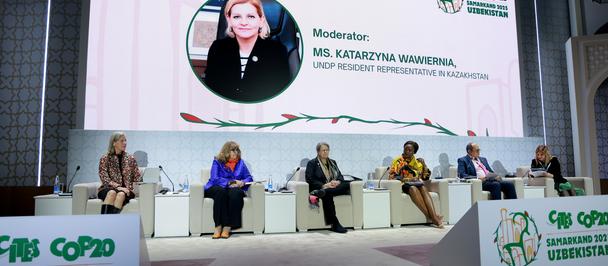The Parliamentary Commission for Monitoring the Implementation of National Goals and Objectives in Sustainable Development discussed issues related to biodiversity conservation and the rational use of ecosystems
March 11, 2025

The latest meeting of the Parliamentary Commission for Monitoring the Implementation of National Goals and Objectives in Sustainable Development of the Republic of Kazakhstan took place today in the Senate, chaired by Speaker of the House Maulen Ashimbayev. Deputies, along with representatives from expert and international organizations, government bodies, and the civil sector, exchanged views on the current situation in the field of biodiversity and mechanisms for improving its conservation, rational use of terrestrial ecosystems for a sustainable future, and several other relevant issues.
Globally, ecosystems are under threat and require comprehensive protection. According to the Sustainable Development Index for 2024, the conservation of terrestrial ecosystems is among the six most pressing issues in Kazakhstan. The country's land use practices exacerbate degradation processes, leading to a decline in the quality of natural resource potential, loss of fertility, degradation of agricultural lands, and loss of species biodiversity.
Participants of the meeting emphasized that primary attention in the framework of biodiversity conservation and rational use of terrestrial ecosystems should be given to increasing forest resources, populations of rare animals, and preventing land degradation and poaching. Specifically, issues such as wind and water erosion, unsystematic grazing, non-compliance with farming technologies, and insufficient control over the use of agricultural land were discussed.
"In Kazakhstan, only 5 percent of the territory is covered by forests. The situation is aggravated by anthropogenic impacts: deforestation, forest fires, and insufficient efforts to restore forest resources. More than 90 million hectares of land are subject to erosion. This problem is one of the most acute for agriculture. Another important task facing the country is the preservation and increase of populations of rare animals. The main problem in this area remains poaching. Illegal trade in horns and skins of rare animals also leads to a decrease in their numbers. Moreover, the preservation of animal diversity is directly related to the state of forest ecosystems, soil, and pastures. Overall, the protection of terrestrial ecosystems and biodiversity conservation requires constant attention and coordinated work of state and public institutions,"
emphasized Maulen Ashimbayev, Speaker of the Senate of the Parliament of the Republic of Kazakhstan.

During the discussion, representatives of government bodies and experts voiced recommendations and initiatives for further joint work. UNDP Deputy Resident Representative in Kazakhstan, Sukhrob Khojimatov, presented the results of joint work in this area and highlighted priority directions for further efforts.
"The main result leading to the achievement of the fifteenth sustainable development goal is that in 2024, in partnership with the Ministry of Ecology and Natural Resources of the Republic of Kazakhstan, we developed a draft Concept for the Conservation and Sustainable Use of Biodiversity in Kazakhstan for a ten-year period. Analysis conducted by UNDP using the BIOFIN methodology showed that from 2015 to 2022, budget expenditures on biodiversity amounted to just over 2 percent of the total volume of republican budget expenditures. In terms of priority, biodiversity is significantly inferior to other sectors, even though the health of the environment is an important criterion for the well-being of the population and the sustainability of the country's economic development. Therefore, we are now working on preparing a resource mobilization plan for biodiversity conservation in Kazakhstan,"
noted Sukhrob Khojimatov.
He also touched upon new approaches piloted by UNDP for regional development through zoning and landscape planning, which will optimize land use, minimize conflicts between different sectors of the economy, and ensure rational use of natural resources to reduce land degradation.

During the meeting, the Speaker of the Senate particularly emphasized the importance of adopting a resolution on the establishment of a Regional Center for SDGs in Almaty for Central Asia and Afghanistan.

 Locations
Locations









